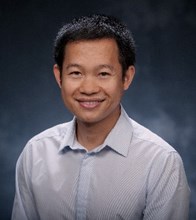
Dr. Hung Cao
University of Washington
Wednesday, March 28, 2018
1:00PM – HEC 450
Abstract
Micro/nano-technologies together with sensing and wireless innovations have been emerging during the last decade as essential assets to enhance healthcare and life-science studies. Cost and care efficiency, quality and efficacy in hospitals, as well as pharmacology and science discoveries have obtained great benefits from multidisciplinary researches. While micro/nano-fabrication provided miniaturized sensors and systems with better sensitivity, selectivity and longevity at minimal power consumption; wireless technology and innovations in electronics helped in cutting healthcare cost, bringing convenience to patients and establishing distanced care which was recently defined as personalized- and tele-medicine of the mobile-health network. With the development of biomaterials, all of these enabled the next-generation biomedical devices that could be wearable or deployed in vivo, targeting diagnosis, prognosis and investigations of chronic diseases as well as continuous health monitoring.
In this presentation, Dr. Hung Cao will introduce engineering approaches to support healthcare and biological investigations. Biocompatible and flexible materials dovetailed with microelectronics and nanotechnology for various applications will be discussed. Approaches targeting some specific diseases will be presented.
Biography
Hung Cao (S’06, M’12, SM’15) received his B.Sc. degree in Electronics and Telecommunications from Hanoi University of Science and Technology, Vietnam in 2003. He got his M.Sc. and Ph.D. in Electrical Engineering from the University of Texas at Arlington in 2007 and 2012, respectively. He served as a lecturer at Vietnam Maritime University from 2003 to 2005. After his Ph.D. training, Dr. Cao worked as a research associate at the Biomedical Engineering Department, University of Southern California (2012-2013) and then at Veterans Affairs Hospital and David Geffen School of Medicine, University of California, Los Angeles (2013-2014) as a scientist. He worked for ETS, Montreal, QC, Canada in 2014-2015 as a research faculty. In Fall 2015, Dr. Cao became an Assistant Professor of Electrical/Biomedical Engineering at School of STEM, University of Washington (UW), Bothell campus. He is also an Affiliate Professor of EE at Seattle campus as well as a Principle Investigator at Institute for Stem Cells and Regenerative Medicine (ISCRM), UW Medicine, South Lake Union campus. His HERO lab at UW focuses on the applications of micro- bio-sensors and bioelectronics for health monitoring in humans as well as biological studies in animal models. He has worked with scientists, engineers and medical doctors worldwide in numerous high-impact biomedical projects, which helped amass his credentials in the fields of biomedical micro-devices, neuroscience and cardiovascular engineering. Dr. Cao is one of the pioneers in utilizing flexible microelectronics to study heart regeneration in small animal models. He has published numerous peer-reviewed journal and conference articles in related fields. Dr. Cao is a recipient of the UW RRF Award (2016), the NSF CAREER Award (2017) and one of the only two nominees under UW competing for the prestigious Moore’s Inventor Fellowship (2017).